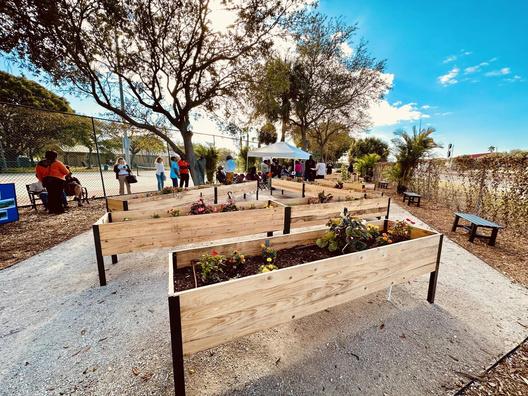
2 minute read
COMMUNITY GARDEN
FAMU Extension spoke with Tavia Gordon, Extension Agent, West Palm Beach, Florida, to discuss the grand opening of the Coleman Park Community Garden During the interview, Ms Gordon shared some vital information about the garden, its positive impact on the community and exciting future plans
FAMUEXTENSION:Whendidthecommunitygardenopen?
Advertisement
VIA: The community garden ribbon cutting was on January 18, 3
MU EXTENSION: What was the process for getting the mmunity garden off the ground?
IA: When I got onboard, the garden infrastructure was ady there. We (the City of West Palm Beach personnel and elf) engaged the community through community meetings. had a meet & greet at the garden, sent out surveys, and had erson interactions with residents. We received supplies for garden, planned planting dates, and had garden days twice week and every third Saturday of each month. Persons who ed the garden did the planting, pruning, weeding, harvesting, (the whole process from seed to harvest). They are the ones help to maintain the garden.
FAMU EXTENSION: How did the public receive the opening of community garden?
IA: From the people that I have met and worked with, they eived it well They are happy with the garden because they able to get fresh vegetables and produce that they don’t e to buy at the supermarket
FAMU EXTENSION: Is there a target population?
TAVIA: No, all ages are welcome to the garden.
FAMU EXTENSION: How many people have benefited from the community garden?

TAVIA: In March, we had 14 participants. In April, there were 17 participants and 16 participants in May. So, we have had a total of 47 participants.

FAMU EXTENSION: What are the benefits of having a community garden?



TAVIA: The garden provides essential programs and fresh local homegrown produce to the residents of West Palm Beach. The northwest area of West Palm Beach is considered a "food desert”, so the community garden provides the City of West Palm Beach residents with the tools and resources to live healthier lives. The garden also serves as an agricultural training site for teaching residents how to grow food and food preservation.
FAMU EXTENSION: How has this project impacted the community?
TAVIA: The project had and is significantly impacting the residents and persons who come to the garden Everyone wants to start growing their own vegetables Another incentive for coming to the garden is that they can take home plants to start their own garden, whether in their backyard, balcony, patio, back porch, or a kitchen windowsill When they return to the garden, they show me pictures of what they are growing as a result of coming to the garden
FAMU EXTENSION: What types of things are you growing?
TAVIA: We had our first harvest of many in April. We have harvested tomatoes, basil, parsley, bell peppers, green onion, and kale. Currently, the garden has tomatoes, bell peppers, basil, zucchini, squash, eggplant, rosemary, oregano, mint, sorrel, sugarcane, lemon grass, aloe vera, thyme, and lavender.
FAMU EXTENSION: What other activities can we expect in the future?
TAVIA: We have upcoming workshops that include: Nutrition programs (youths & seniors), 4-H Youth programs, Bee Talk, Container Gardening, Grill at the Garden, Teen Talk with Police Athletic Club West Palm Beach (PAL), and CIVIC (Community Voices, Informed Choices): South Florida Food Systems, and Deliberative Discussion (FAMU & UF Cooperative Extension)

FAMU EXTENSION: How can someone contact you about the community garden?
TAVIA: I can be contacted by email at tavia.gordon@famu.edu or tgordon@wpb.org, and my telephone number is 561-804-4970.










